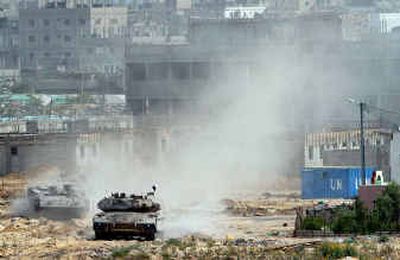Israeli troops kill 20 Palestinians in Gaza

JERUSALEM – Israeli troops backed by tanks and helicopter gunships battled militants in the southern Gaza Strip on Tuesday, killing at least 20 Palestinians as Israel continued its biggest offensive in the seaside strip during more than 3 1/2 years of conflict.
Israeli officials said the daylong incursion, beginning with a flurry of predawn air attacks and skirmishing that resulted in half of the deaths, was an attempt to confront militants and stanch weapons smuggling along the Gaza Strip’s border with Egypt. That area has seen frequent, though smaller-scale, skirmishing between Palestinian gunmen and Israeli soldiers.
Israeli officials say cross-border tunnels to the Rafah refugee camp near where the fighting took place are a pipeline for explosives and weapons destined for militants in Gaza.
Palestinian leaders charged that the raid, in the Tel al-Sultan neighborhood outside the Rafah camp, could trigger a humanitarian crisis. They appealed to the international community for help.
“What is going on in Rafah is a series of inhumane crimes and criminal acts against Palestinian civilians and their property,” Palestinian Prime Minister Ahmed Qureia charged in a written statement.
In defending Tuesday’s strike, dubbed “Operation Rainbow,” the Israeli army’s chief of staff, Lt. Gen. Moshe Yaalon, said past incursions failed to stem the flow of rocket-propelled grenades and launchers. Israel also could face a more serious threat posed by longer-range rockets, he said.
“After we tried to convince the Palestinian authorities to put an end to this, we have recently been forced to stop this ourselves,” Yaalon told reporters. “Those who prefer the smuggling of weapons over the lives of the population along the Israel-Egypt border are the Palestinians, and therefore we are forced take the actions we are presently taking.”
Israeli officials said the incursion, which left more than 40 Palestinians wounded, wasn’t linked to the killings of 13 Israeli soldiers last week by militants in the Gaza Strip.
There were no Israeli casualties reported in the latest fighting.
Israeli troops, supported by tanks and aircraft, placed a tight cordon around the Rafah refugee camp and a neighboring town of the same name. The ring effectively sealed off the southern tip of the Gaza Strip, making passage in and out of the area difficult.
Palestinian ambulance crews reported that fighting made it harder to get to the wounded, and Physicians for Human Rights said the road closures barred medics from moving wounded to a better-equipped hospital in the nearby town of Khan Younis. Israeli military officials said they were trying to allow ambulances to pass, but sporadic shooting was causing delays.
Among the dead were 14-year-old Asmaa Moghayer and her 11-year-old brother, Ahmed, who were shot when they climbed onto the roof of their home to collect laundry.
On Monday, hundreds of Palestinian families fled their homes, fearing an Israeli attack and destruction of houses along a patrol road next to the Egyptian border.
Israeli forces demolished dozens of houses there last week, and officials suggested more might be razed to widen the road’s buffer. On Tuesday, the nation’s Supreme Court for the second time in less than a week rejected an appeal by Palestinian residents to block such an action. The demolitions drew international criticism, including from the United States.
Few houses were demolished during Tuesday’s raid, and Israeli military officials took pains to say the purpose was not to raze homes, except those used by gunmen or that concealed tunnel openings.
The incursion – coupled with fears that more demolitions would follow – prompted an outcry from the Palestinians and others. Qureia, the prime minister, urged the United States and three co-sponsors of the so-called “road map” to peace – Russia, the European Union and United Nations – to pressure Israel to stop the offensive. The Arab League called for a meeting of the U.N. Security Council to take up the matter.
Also Tuesday, Amnesty International issued a report accusing Israel of violating international standards on human rights by destroying more than 3,000 Palestinian houses and properties during the past 36 1/2 years, costing tens of thousands of people their homes or livelihoods.
Israel defended its right to raze houses where Palestinian gunmen take up fighting positions in populated areas or that conceal tunnels.